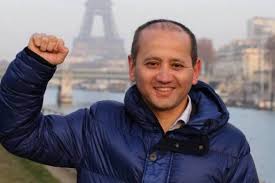 Facebook and Telegram have been malfunctioning since an opposition movement was labelled extremist.
Facebook and Telegram have been malfunctioning since an opposition movement was labelled extremist.
Communications authorities in Kazakhstan have revealed that their efforts to delete online material produced by a banned opposition movement are behind the recent inaccessibility of popular social media websites and messaging applications.
Tengri News website cited the Information and Communications Ministry as saying on March 21 that their content-deletion campaign is in compliance with a recent court ruling to designate the Democratic Choice of Kazakhstan, or DVK, an extremist organization.
“Work is being done to delete nonlegal material. Because of that, there may be some technical problems in the functioning of social media websites and messengers,” the ministry said in a statement.
The move to formally register DVK as extremist was initiated by the General Prosecutor’s Office in the latest of a very long series of measures aimed at neutralizing exiled government foe Mukhtar Ablyazov. The designation means anybody found distributing the movement’s messages, even in electronic form, can face prosecution on extremism charges.
Speaking on March 13, Yerlan Abayev, a representative of the General Prosecutor’s Office, advised internet users against either sharing, commenting on or subscribing to any feeds produced by the DVK. He said that failure to abide by those recommendations could result in a fine or up to two years in prison.
Facebook users in Kazakhstan first began reporting trouble accessing the website in the middle of March, which was when the court ruling on the DVK was passed. Visitors to the website first found they were unable to load the mobile version and the problem then affected the desktop edition too. Telegram, a messaging app that is widely used by news outlets and groups like the one led by Ablyazov, has also been experiencing patchy performance.
Many social media users were derisive of the extremism ruling. One widely circulated meme showed a picture of Ablyazov edited to look like Osama Bin Laden. Ablyazov mockingly posted that image to his own Facebook page.
Ablyazov fled the country in the late 2000s over concerns of possible imminent arrest. He has long insisted that the government’s desire to put him in jail stems from his history of political opposition, while authorities simply insist the former banker is a power-hungry, serial crook. In 2017, Ablyazov was sentenced in absentia to 20 years in jail for allegedly embezzling and spiriting $7.5 billion out of Kazakhstan. He spent some time in jail in France pending court hearings on possible extradition to Russia, but was released in December 2016. Since that time, he has done much of his politicking online. He has latterly aped Russian opposition activist Alexei Navalny and taken to creating video appeals that he posts to his Facebook page.
While claiming, quite dubiously, to enjoy strong support among the population in Kazakhstan, Ablyazov is a fundamentally marginal political figure, making Astana’s increasingly frantic attempts to pin all possible evils on him appear all the more bizarre. The General Prosecutor’s Office takes the fugitive businessman very seriously, however, and argues that Ablyazov’s addresses create a “negative image of the authorities and are stirring protest sentiments.”
Eurasianet, Mar 21, 2018




